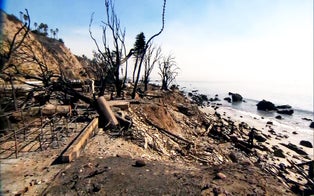Massive security surrounds the Minneapolis courthouse where murder trial of ex-cop Derek Chauvin was scheduled to begin Monday in the killing of George Floyd. A judge postponed proceedings for at least a day.
Massive security surrounds a Minneapolis courthouse where the highly anticipated murder trial of ex-cop Derek Chauvin began Tuesday in the killing of Black resident George Floyd.
An additional count against Chauvin was added Thursday after Hennepin County District Judge Peter Cahill granted a prosecution request to reinstate a third-degree murder charge against Chauvin. The judge initially dismissed that count in October, saying it didn't apply to this case.
The third-degree charge, sometimes known as "depraved mind" murder, requires a lower standard of proof than second-degree murder. The reinstatement followed an unrelated case ruling this week in state appellate court that established precedent in applying third-degree murder charges.
Barbed wire, concrete barriers and boarded up windows mark the downtown area, and many offices and restaurants have closed their doors in anticipation of demonstrations and protests. The Hennepin County Government Center, where the trial will take place, has already moved much of its operations to outlying buildings.
Chauvin, 44, already faces second-degree murder and second-degree manslaughter in the killing of Floyd, 46, in south Minneapolis on May 25. Cellphone video taken by a bystander showed Chauvin kneeling on Floyd's neck for nearly nine minutes as he yelled "I can't breathe" and a growing crowd shouted for officers to get off Floyd, who was handcuffed behind his back and lying prone on the asphalt.
Chauvin is being tried separately from three other former Minneapolis police officers charged in connection with Floyd’s death. Their joint trial is scheduled for August. The four men were fired last year and all have denied any wrongdoing in Floyd's death, which was deemed a homicide in an autopsy that also noted the presence of drugs and underlying health conditions as contributors to his death.
The killing of Floyd prompted national outrage and protests, accompanied by some looting and violence.
Thousands of National Guard troops, accompanied by police officers, will be on hand at the courthouse for security.
Here is what you need to know about the trial.
Jury Selection in Derek Chauvin's Trial
Choosing a jury, or voir dire, is the first part of the trial and began Tuesday, after a daylong postponement. Prosecutors and defense attorneys will chose 12 panelists and four alternates.
Because of COVID-19 restrictions, eight potential jurors will go to the courthouse, four in the morning and four in the afternoon, to be questioned individually by Judge Cahill and lawyers on both sides.
The prosecution and defense may ask the judge to dismiss a juror "for cause," if there is a clear reason they couldn't fairly decide the facts of the case.
If a potential panelist isn't dismissed "for cause," then each side has the power to use one of its "peremptory challenges" to strike that person. Prosecutors have nine peremptory challenges and Chauvin's lawyers have 15.
Once 16 jurors are agreed upon, they are sworn in. No matter how quickly they are chosen, testimony isn't scheduled to begin until March 29. The jurors' names will be kept secret, and will remain so until Cahill rules they can be made public.
The judge will also rule whether the panel should be sequestered during the trial.
What Testimony to Expect in Chauvin's Trial
On March 29, prosecutors and defense attorneys will present their arguments, witnesses and evidence, with the prosecution going first.
Much of the debate is expected to focus on Floyd's cause of death, with the defense expected to focus on a coroner's report that determined his homicide was a combination of the officers’ use of force, the presence of fentanyl and methamphetamine in Floyd’s system and his underlying health conditions.
The burden of proof is on the prosecutors. Defense attorneys do not have to prove their client is not guilty.
The trial is expected to take several weeks and subsequent jury deliberations are estimated to last from one to two weeks.
How to Watch the Trial of Derek Chauvin
The judge has ruled cameras will be allowed in the courtroom, a first for Minnesota. The proceedings will be broadcast live by Law&Crime, CBSNMinnesota, and Court TV.
What Security and Coronavirus Precautions Will Be Observed in the Courtroom During Chauvin's Trial?
The global pandemic has significantly impacted protocols for the criminal trial. Everyone in the court must wear masks and maintain social distancing of six feet at all times. Plexiglass partitions will divide some seats in the courtroom, and hand sanitizer and wipes will be on hand for all participants.
The Government Center will be closed to the public. Trial participants will be escorted to the courtroom through secured entrances that will not be visible to the public. No one involved in the trial, including Chauvin, will be seen in public areas of the building.
The number of people in the courtroom will also be drastically reduced. Only one relative of the defendant and the victim will be allowed inside at any given time. One print reporter and one television journalist will be allowed to enter.
The defense team and the prosecution are limited to four people each. Also present will be a court reporter, the judge, his clerk, the defendant and an audio/visual technician.
The National Guard has mobilized 3,000 soldiers to help with security.
RELATED STORIES





